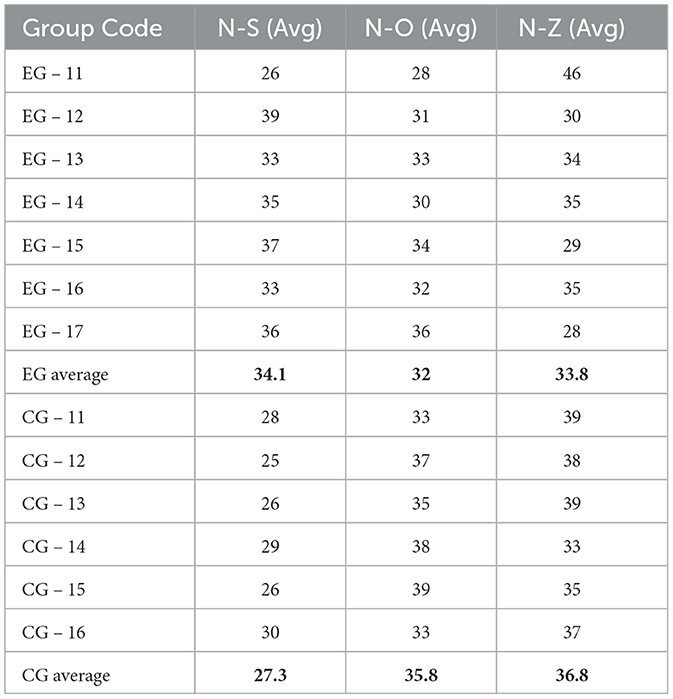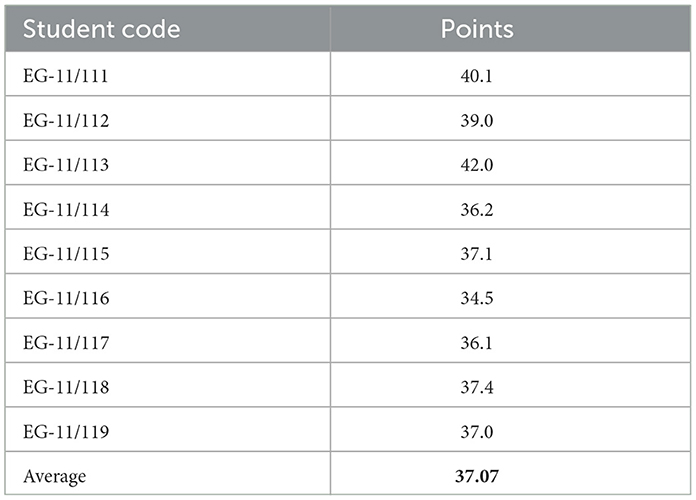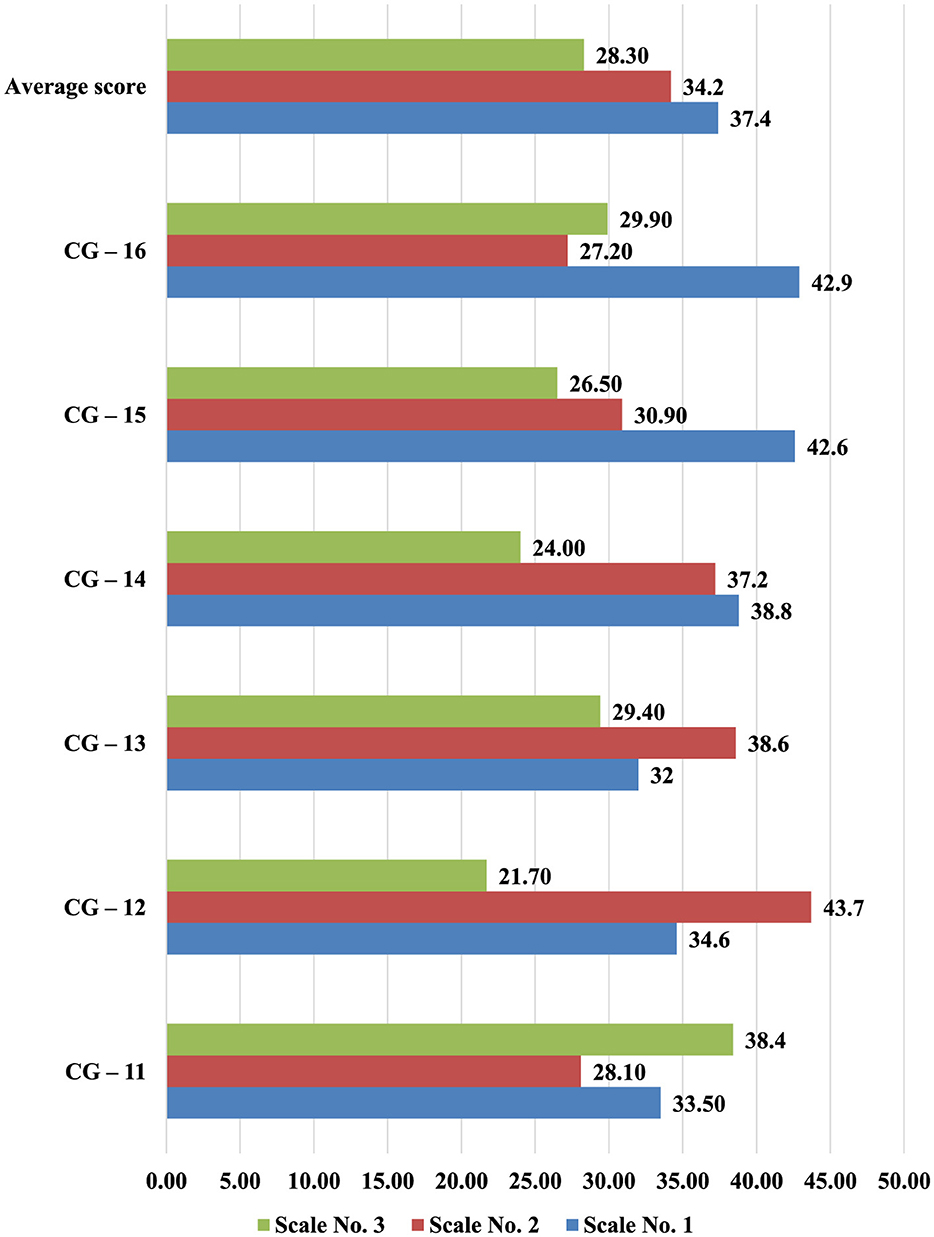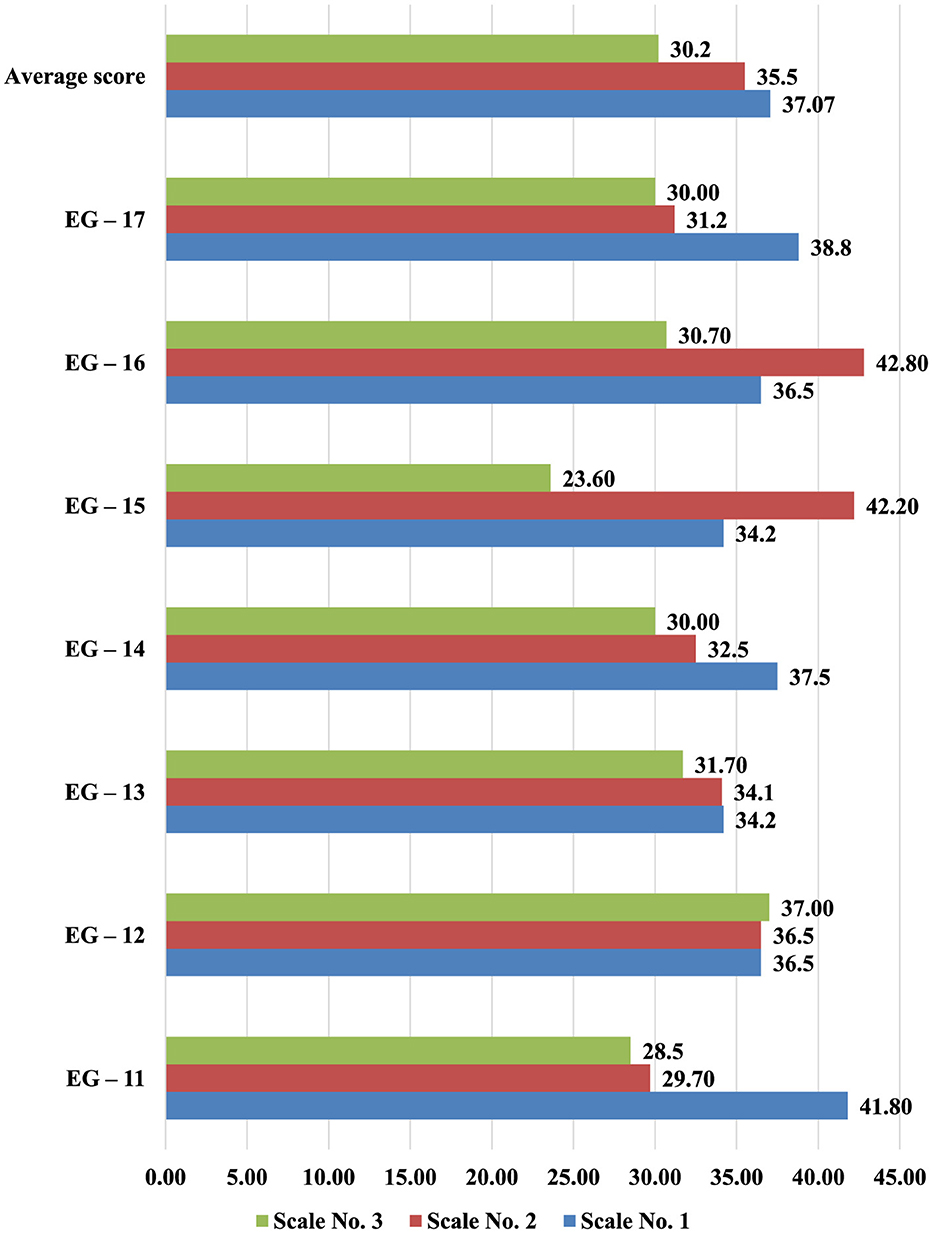- 1Toraighyrov University, Pavlodar, Kazakhstan
- 2Astana International University, Astana, Kazakhstan
This study investigates the role of student self-government in developing managerial potential among university students in Kazakhstan through a quasi-experimental design. The research assessed how structured participation in self-government affects leadership qualities, organizational skills, and self-efficacy. Two comparable student cohorts were observed over one academic year: an experimental group (n = 90) that participated in a structured self-government program and a control group (n = 78) that followed the standard curriculum. Both groups completed identical pre- and post-intervention assessments using validated psychometric instruments measuring motivation, self-esteem, achievement drive, and psycho-emotional wellbeing. Statistical analyses revealed that the experimental group showed significant improvements in self-orientation, self-esteem, and psycho-emotional indicators (Cohen's d ≈ 0.4–0.6), whereas the control group exhibited no meaningful change. These results demonstrate that systematic engagement in student self-government can moderately enhance managerial potential through experiential leadership practice. The findings underscore the educational value of structured self-governance initiatives for fostering managerial and leadership competencies in higher education.
1 Introduction
Recent trends toward democratization have increased transparency in governance, underscoring the importance of active citizen engagement for effective decision-making and societal development. Concurrently, higher education is a crucial arena for cultivating competencies essential for modern management. In today's competitive labor market, robust managerial potential is critical for career success and organizational performance (Asghar et al., 2023; Macfarlane et al., 2024). The managerial potential is making timely, informed decisions, leading effectively, and adapting to rapid change.
Understanding students' personal and managerial qualities—such as motivation, leadership self-efficacy, and decision-making skills—is crucial for maximizing the benefits of student self-government participation. Recent studies emphasize that structured experiential learning significantly enhances these qualities, making self-government a potentially powerful educational strategy (Martínez and Vera, 2024; Pandita and Kiran, 2023; Pizzo et al., 2025).
In Kazakhstan, higher education is undergoing significant modernization, driven by regulatory initiatives such as the State Youth Policy (On State Youth Policy, Pub. L. Nos. 285-V 3PK, 2015) and the Concept of State Youth Policy of the Republic of Kazakhstan for 2023–2029 (2023). These reforms emphasize holistic student development and active participation in university affairs. In this context, student self-government organizes extracurricular activities to nurture leadership, project management, and practical communication skills.
The significance of student self-government in Kazakhstan extends beyond mere participation in university management or the organization of leisure activities. It is also instrumental in developing the skills necessary for a successful career in any field. The experiential learning provided by student self-government becomes invaluable in the labor market. Student self-government also contributes to developing managerial potential by allowing students to cultivate essential attributes, such as responsibility, organizational and leadership skills, and teamwork abilities. Through these experiences, students are better prepared for professional activities and can develop key competencies for successful functioning in a dynamically changing world (Kayumova et al., 2022).
Recent research underscores that leadership and managerial potential are not innate but can be intentionally developed through reflective, student-centered, and experience-based programs (Macfarlane et al., 2024; Numonova, 2024; Rubens et al., 2018). These approaches emphasize goal-setting, autonomy, and project-based learning—principles also embedded in student self-government.
Nonetheless, several challenges remain associated with the effectiveness of student self-government in Kazakhstan. These challenges include the influence of cultural characteristics, prevailing traditions, and the varying maturity levels of self-government institutions within universities (Government of the Republic of Kazakhstan, 2018). Accordingly, this research aims to analyze the influence of student self-government in Kazakhstan on the development of managerial potential among students. It further seeks to identify factors that may enhance the effectiveness of these processes, thereby supporting the further development of organizational and leadership skills through active participation in student organizations (Kazimova et al., 2024).
1.1 Literature review
This literature review synthesizes findings from classical and contemporary scholarship on management, managerial potential, and student self-government and develops a conceptual framework linking these constructs. Early management theorists, notably Fayol, emphasized psychological principles in management (Fayol, 2013). This perspective laid the groundwork for the emergence of management psychology. Subsequent contributions by Drucker and Mayo shifted the focus toward human relations, underscoring that effective decision-making and goal-setting are critical skills for managers (Drucker, 2006; Mayo, 1933). These classical foundations inform current understandings of managerial potential as a continuously evolving system of personal and professional attributes that enable individuals to make timely, effective management decisions (Shalabayev, 2021). In this context, managerial potential is closely linked to “human potential,” as both involve inherent traits and intellectual resources such as self-confidence, self-reliance, and an ongoing commitment to learning (Gushchina, 2006; Kayumova and Xembayeva, 2021).
Contemporary studies extend these classical insights by emphasizing that managerial potential encompasses technical decision-making skills, motivational factors, and the capacity for rapid adaptation in a dynamic environment (Akishina et al., 2022; Burdina, 2006; Sarbasova et al., 2022; Sarzhanova et al., 2025; Shalabayev, 2021; Tulekova, 2020). The literature highlights that personal qualities such as the desire to acquire new competencies and a strong drive for self-improvement are essential for managers to meet today's competitive labor market demands. However, despite clear delineations of these skills in management theory, the direct influence of student self-government on cultivating such qualities remains underexplored.
Rousseau argues that when liberated from traditional constraints, young people can occupy meaningful societal roles, forming the foundation of student self-government (Rousseau, 2018). Over time, universities have evolved into spaces where self-government facilitates administrative participation and promotes leadership development and civic engagement. Scholars such as Daloyev (2012) and Kuznetsova and Frolova (2014), supported by Syrtsova (2007), argue that student self-government serves as an educational mechanism that nurtures freedom of expression, responsibility, and self-improvement. These mechanisms foster a network of interactions essential for building leadership and decision-making competencies.
Empirical studies further demonstrate that student self-government positively impacts personal and professional development by creating robust channels for interaction between students and university administration (Klimovich and Ofitserov, 2011; Rumyantseva, 2012). Moreover, research by Kazakhstani scholars underscores the role of self-government in shaping personal and social values (Abildinova et al., 2024; Karatayeva et al., 2024). Managerial potential develops through the process of value formation (Akzhalov, 1991; Bisenbayeva, 2004; Kolumbayeva and Khan, 2014; Mirza, 2017; Nurgaliyeva, 1993; Sagadiyeva and Mirza, 2023; Teslenko and Lepeshev, 2014). In parallel, foreign research provides additional evidence that targeted leadership training enhances managerial capabilities (Beauchamp et al., 2007; Heffernan, 2021; Morosanu et al., 2010; Rubens et al., 2018). Gill (2013) and Popandopulo et al. (2023) highlight the trainability of managerial potential through structured interventions.
Recent contributions have expanded this perspective by incorporating structured, practice-oriented leadership programs into higher education. For instance, Rubens et al. (2018) demonstrate how strategic self-assessment and goal-setting within leadership curricula contribute to students' decision-making and initiative. Heffernan (2021) emphasizes the role of identity-building and self-efficacy in leadership development, calling for authentic engagement opportunities like student organizations. Similarly, Numonova (2024) and Aripova (2025) advocate for modular, competency-based models that integrate seminars, project work, and reflective feedback—features closely mirrored in student self-government.
(Martínez and Vera 2024) demonstrated that structured experiential learning interventions significantly improved students' transformational leadership competencies, including intellectual stimulation, motivational engagement, and reflective practice. Similarly, Pizzo et al. (2025) reported enhanced managerial competencies such as interpersonal communication, empathy, and organizational skills arising from online experiential projects—skills that align closely with those required for effective student self-governance. Pandita and Kiran (2023) findings further underscore experiential learning's positive impact on managerial skill development, highlighting motivational dimensions such as autonomy, reflective practice, and achievement orientation.
Despite this wealth of literature on management and student self-government independently, a significant research gap persists regarding the integrated influence of student self-government on the development of managerial potential. While some studies assert that self-government empowers students with autonomy and fosters leadership, others question its effectiveness in translating experiential learning into tangible management skills. Furthermore, empirical research within the Kazakhstani context remains limited, justifying the current study.
Student self-government enhances managerial potential by developing leadership skills, improved decision-making, and increased personal initiative. The research integrates classical management theories with contemporary educational practices and addresses conflicting perspectives by critically examining the scope and limitations of student self-government as a developmental tool. By synthesizing these diverse strands of literature, the present review establishes both the theoretical and practical rationale for investigating the direct impact of student self-government on managerial potential, particularly within Kazakhstan's unique cultural and institutional context.
1.2 Problem statement
Although prior research has established the value of student self-government for leadership development, few studies have directly linked such participation to measurable improvements in managerial competence, particularly within Kazakhstan's unique cultural and institutional context. This study addresses this gap by combining a literature review with an empirical group-based approach. Specifically, it explores how student self-government contributes to the formation of core managerial attributes—namely decision-making, initiative, self-confidence, responsibility, and leadership capacity—that collectively define students' potential for effective management and organizational behavior in educational settings.
1.3 Research questions and hypotheses
Research Question 1: What measurable effects does participation in student self-government have on students' managerial potential?
Research Question 2: What contextual and personal factors facilitate or constrain leadership and organizational skill development through student self-government?
Hypothesis: Students actively involved in self-government will exhibit higher managerial potential reflected by enhanced self-esteem, effective decision-making, and greater personal initiative than peers who do not participate.
1.4 Research objectives
1. Evaluate the Impact of Student Self-Government Participation: Examine how structured participation in university self-government influences students' managerial potential, including leadership, self-esteem, and motivation indicators.
2. Identify Key Factors Affecting Managerial and Leadership Development: Determine which contextual or personal factors facilitate or constrain the development of managerial potential through self-government activities.
3. Compare Outcomes Between Experimental and Control Groups: Assess differences in managerial potential between students who participated in the structured self-government program and those who followed the standard curriculum.
By addressing these research objectives and questions, the study seeks to fill the identified gap in the literature and offer actionable insights for educators and policymakers in Kazakhstan.
2 Methods and materials
To achieve these research objectives, a quasi-experimental design was employed over one academic year. Two groups were compared: an experimental group that participated in a structured self-government program and a control group that continued its standard curriculum. Both groups completed the same questionnaires at the start and end of the year to measure changes in managerial potential.
2.1 Participants
The study involved students from two universities in Kazakhstan. Ninety students from Toraighyrov University were in the experimental groups (coded EG11–EG17), and seventy-eight students from Satpayev University were in the control groups (coded CG11–CG16). Baseline demographic and academic characteristics for both cohorts are summarized in Table 1; independent-samples t-tests and χ2 tests confirmed that no significant differences existed across six key variables (all p > 0.10). Participants were recruited voluntarily after an informational session outlining the study's aims and procedures. Whole-institution (cluster-level) allocation is now standard practice for educational trials where contamination between arms is likely; recent methodological guidance identifies it as an evidence-based safeguard against dilution bias (Hemming and Taljaard, 2023; Dressler et al., 2025). Empirical studies in school and university settings likewise show that cluster designs reduce cross-group diffusion and compensatory rivalry when the intervention is highly visible (Azam et al., 2021; Torgerson, 2001). Site membership was therefore included as a binary covariate in all multivariate models, and effect sizes were unchanged when this covariate was removed, indicating negligible site bias (Baumann et al., 2025).
The decision to use two different universities was based primarily on practical considerations, including the authors' prior coordination with university administrations and institutional approval processes. Implementing the intervention (a structured student self-governance program integrated into extracurricular activities) required administrative support and curriculum scheduling, which was possible at Toraighyrov University due to existing collaboration channels. In contrast, it was not feasible to divide students into experimental and control groups within the same university, as doing so would have required parallel curricular changes that were not administratively permitted during the study period. Therefore, Satpayev University served as the control group site, where students continued with their standard academic programs. Both institutions follow the national Ministry of Education charter for student self-government and operate similarly structured campus-wide student councils, minimizing contextual disparities in governance opportunities across sites.
2.2 Instruments
The research methods were selected based on collaborative approaches described by Penuel et al. (2011), which integrate group work and collective initiatives in the study of management and decision-making skills. This design provides a multifaceted assessment of the impact of student self-government on managerial potential. A suite of standardized instruments was employed to capture various dimensions of managerial potential (Karelin, 2007). Researchers selected these instruments for their psychometric soundness, including construct validity and reliability, as noted by several studies. To ensure suitability for the current context, a pilot administration involving 25 students was conducted to verify translation clarity and internal consistency (Cronbach's α = 0.78–0.89 across scales), confirming acceptable reliability levels. These instruments have been widely applied in educational and leadership research and demonstrate satisfactory construct and convergent validity, as supported by prior studies. Instruments were specifically selected to capture critical personal and managerial qualities identified in recent literature as integral for leadership development, including motivation, self-efficacy, leadership identity, personal initiative, and decision-making capabilities (Abdul-Rahim and Abdul Mumin, 2025; Rubens et al., 2018).
1. Smeikal-Kuchera Questionnaire (B. Bass's Methodology): This instrument diagnoses orientation toward oneself (N-S), orientation toward others (N-O), and orientation toward tasks (N-Z).
2. Achievement Motivation Questionnaire: Developed by T. Ehlers, this questionnaire assesses the motivational orientation of respondents.
3. Self-Assessment of Needs (SAN) Questionnaire: This tool evaluates wellbeing, activity, and mood.
4. Determining the Quantitative Expression of Self-Esteem: Developed by S. A. Budassi, this measure assesses the discrepancy between self-assessed personal qualities and those attributed to an ideal personality.
5. Achievement Need Questionnaire (AN): Developed by M. Yu. Orlov, this instrument evaluates the intrinsic need to improve performance and persist in goal-directed behavior.
Each instrument addresses one or more aspects of managerial potential, including motivation, decision-making, personal confidence, and critical self-assessment. Their combined use ensures comprehensive coverage of leadership attributes that student self-government activities could influence. The tests were accessed online (Psychological Tests Online, 2025a,b; Online Test Pad, 2025; Survio., 2025). Overall, the chosen tools demonstrated adequate reliability, cultural appropriateness, and theoretical relevance for assessing managerial potential among university students in Kazakhstan.
2.3 Procedure
The researchers collected data in two phases during the academic year:
• Phase 1 – Entry Stage:
All participants completed an online battery of standardized questionnaires (Smeikal-Kuchera, Achievement Motivation, SAN, Self-Esteem, and Achievement Need Questionnaires) to obtain baseline measures of managerial potential and related constructs.
• Phase 2 - Intervention Stage for the Experimental Group:
Following the baseline assessment, the experimental group participated in a 32-week structured self-government program, while the control group continued with their standard academic curriculum without any additional intervention. The intervention combined weekly coach-led workshops (90 minutes), team project laboratories, and asynchronous reflective journals (30 minutes per week). Its thematic sequence, signature experiential activities, and assessed artifacts are summarized in Table 2.
Two leadership coaches, both holding MA degrees in Educational Leadership and possessing at least 3 years of professional experience in student-affairs management, were recruited from outside the core research team to avoid evaluator bias. They were not involved in data collection or analysis. Both coaches completed a short orientation on the research protocol, confidentiality, and standardized delivery of training materials.
To ensure uniformity, the two coaches jointly co-taught the first two sessions for calibration and then alternated delivery on a weekly basis throughout the 32-week period, maintaining continuous coordination via shared progress logs and weekly debrief meetings with the principal investigator. Each session followed a standardized slide deck, scripted role-play cases, and assessment rubrics prepared by the research team to guarantee methodological consistency.
Mean attendance was 88 % (SD = 7 %), and fidelity checks on ten randomly audited sessions indicated 94 % adherence to the session plan. During coaching, mentors provided formative feedback on students' communication, decision-making, and leadership behaviors, but summative evaluations were conducted independently by the researchers to preserve objectivity.
• Phase 3 – Exit Stage:
At the end of the academic year, all participants completed the same set of standardized questionnaires used during the entry stage. The pre- and post-intervention data provided benchmarks for evaluating managerial potential—operationally defined as a composite of five key personal and managerial attributes:
1. Decision-making orientation and self-direction (measured by the Smeikal–Kuchera Questionnaire);
2. Achievement motivation and goal orientation (Ehlers's Achievement Motivation Questionnaire);
3. Psycho-emotional adaptability and activity level (Self-Assessment of Needs – SAN);
4. Self-esteem and self-perceived competence (Budassi's Quantitative Self-Esteem Scale); and
5. Intrinsic achievement drive and perseverance (Orlov's Achievement Need Questionnaire).
6. Together, these dimensions represent the integrated construct of managerial potential and its associated attributes—leadership readiness, emotional stability, initiative, and adaptive behavior—used to assess the developmental impact of student self-government participation.
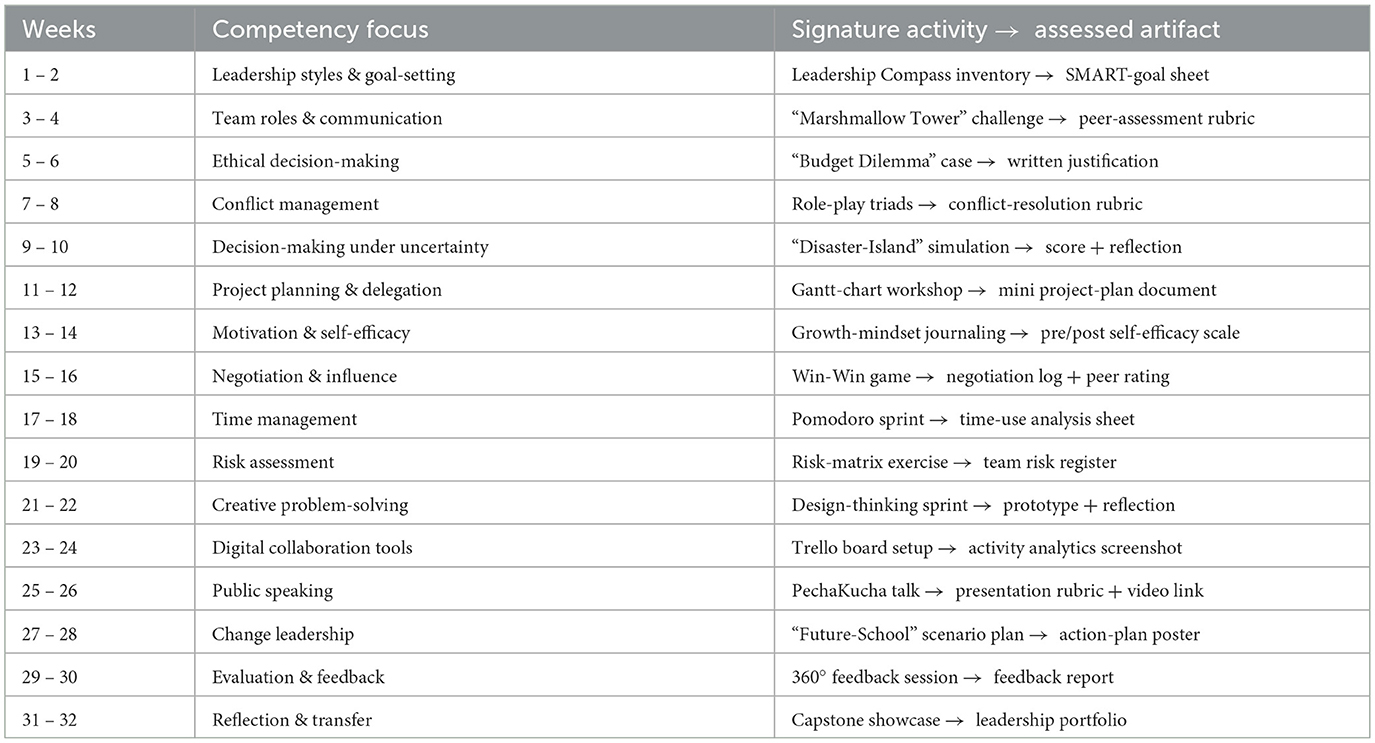
Table 2. Week-by-week thematic blocks, signature activities, and assessed artifacts of the 32-week structured self-governance intervention.
2.4 Data analysis
Data were entered into SPSS and analyzed using nonparametric tests for dependent and independent samples. The study computed mean scores in both experimental (EG) and control (CG) groups on the orientation scale, achievement motivation questionnaire, SAN measure, self-esteem scale, and need for achievement instrument. Researchers used Spearman's rank correlation for self-esteem to compare “self” and “ideal” ranks.
3 Results
Baseline checks showed no significant differences between experimental and control cohorts on any measured characteristic (all p > 0.10; see Table 1). Full pre- and post-intervention statistics are summarized in Table 3.
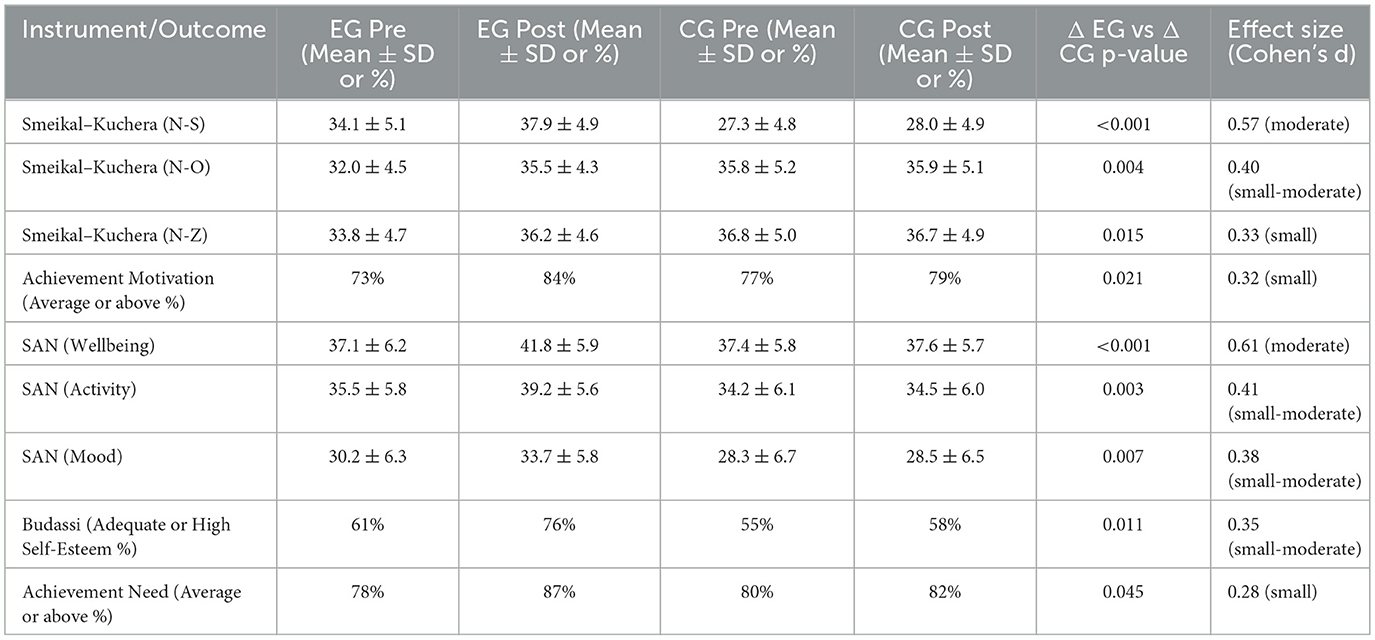
Table 3. Pre- and post-programme descriptive statistics, within- and between-group tests, and effect sizes for all perception and skill outcomes.
3.1 Smeikal–Kuchera Questionnaire (B. Bass's methodology)
This instrument diagnoses personality orientation by identifying the balance among self-orientation (N-S), communication (N-O), and task-focused behavior (N-Z). Table 4 provides an overview of the average group scores at the entry stage. Researchers labeled each subgroup in the experimental groups (EG) and control groups (CG) according to the codes used during data collection. Figures 1, 2 illustrate these trends graphically. The average scores in the experimental groups (EG) were N S = 34.1, N O = 32, and N Z = 33.8, indicating a relatively balanced approach that combines self-directed attitudes, social engagement, and task orientation. By contrast, the control groups (CG) averaged N S = 27.3, N O = 35.8, and N Z = 36.8, suggesting a stronger emphasis on communication and task focus and lower self-directed orientation. Post-test gains were evident in the experimental group: N-S rose to 37.9 ± 4.9, N-O to 35.5 ± 4.3, and N-Z to 36.2 ± 4.6 (all Wilcoxon Z > 3.1, p < 0.01), whereas the control group showed no meaningful change (see Table 3). The between-group differences yielded moderate effect sizes (e.g., d = 0.57 for N-S), indicating a substantive improvement in self-orientation and overall balance.
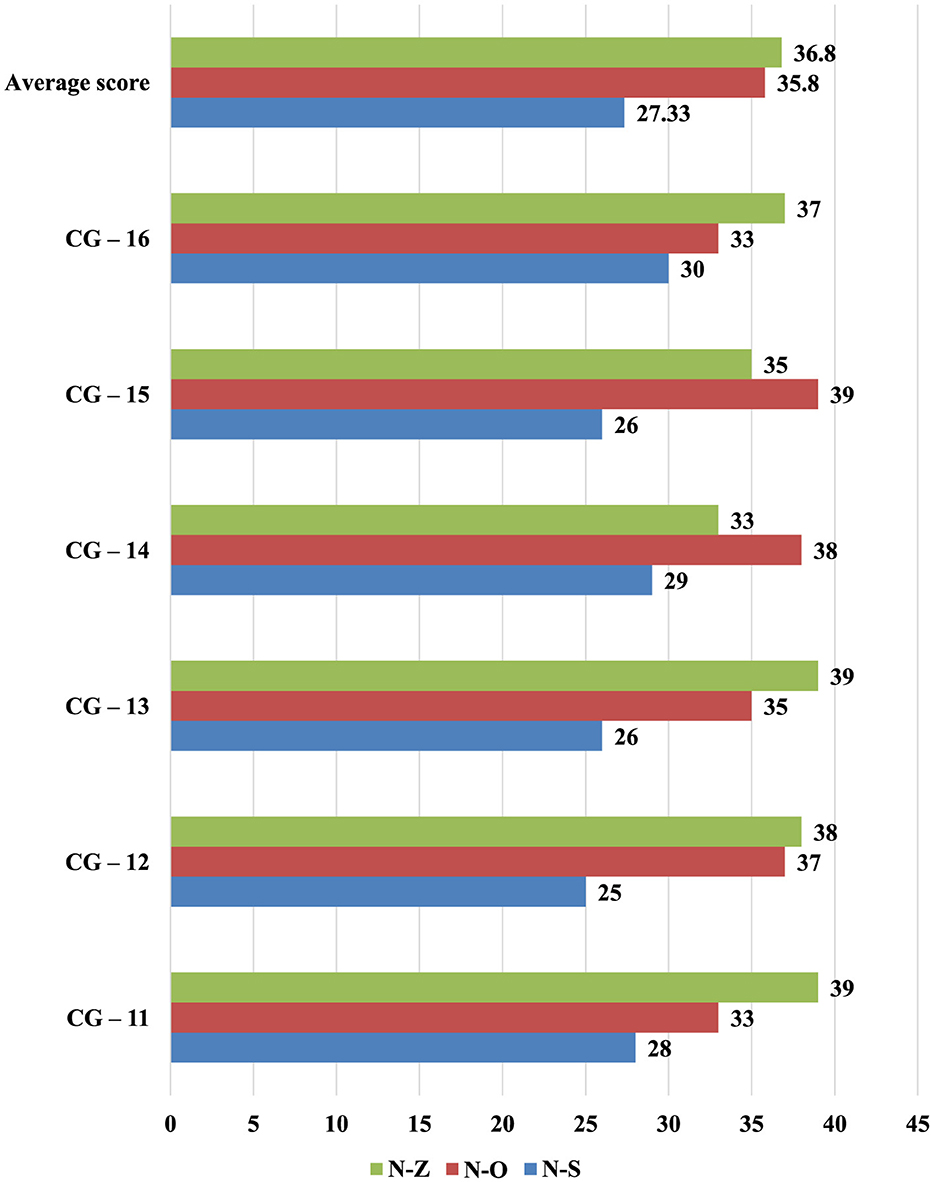
Figure 1. Average results for B. Bass's methodology of CG diagnosing personality orientation (Smeikal Kuchera Questionnaire) at the entry stage.
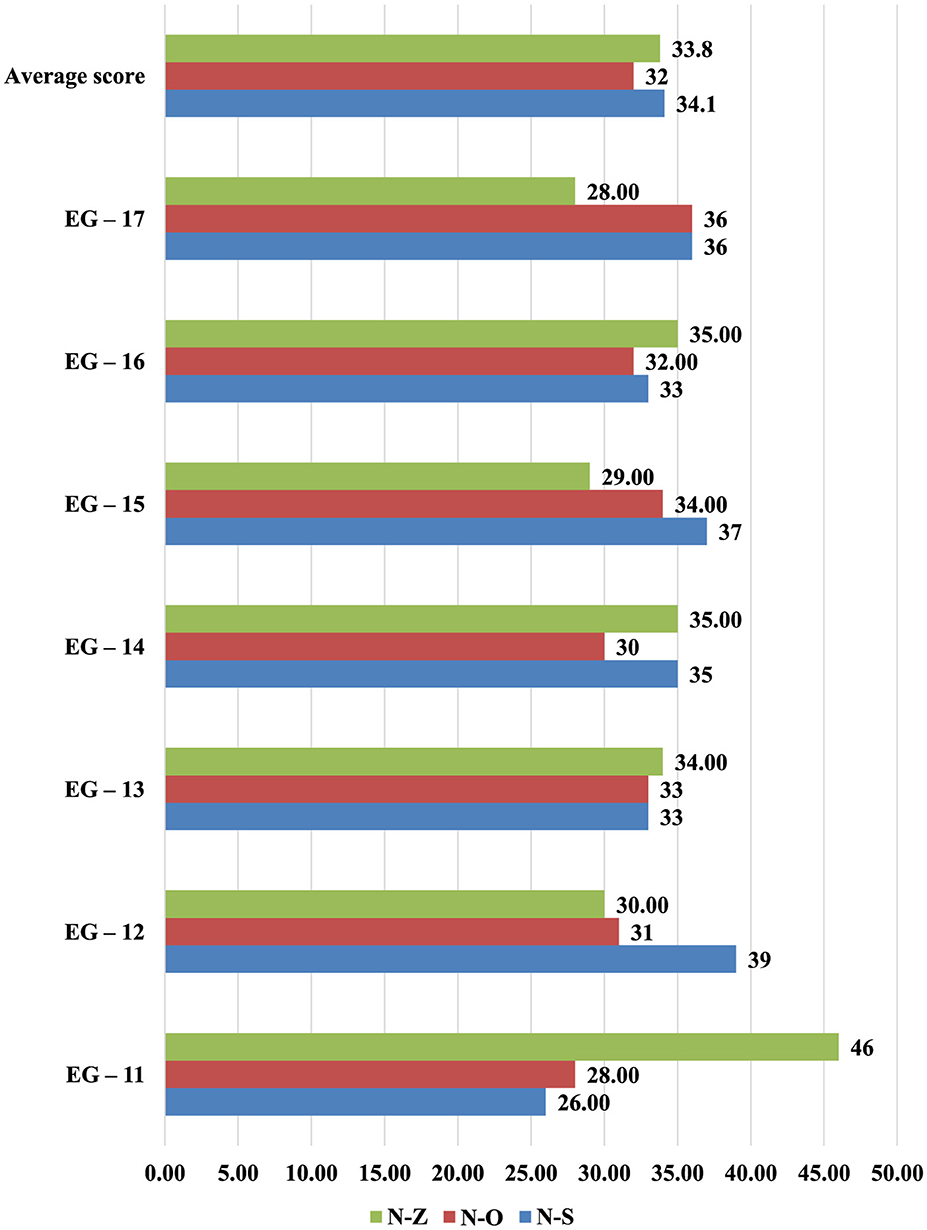
Figure 2. Average results for B. Bass's methodology of EG diagnosing personality orientation (Smeikal-Kuchera Questionnaire) at the entry stage.
3.2 Achievement motivation questionnaire (T. Ehlers)
The instrument measures how strongly respondents aspire to succeed, classified into four ranges: low (1–10 points), average (11–16 points), moderately high (17–20 points), and very high (≥ 21 points). Table 5 summarizes the distributions in both groups. In both EG and CG, most respondents reported an “average” level of motivation (11–16 points Among EG respondents, 27% reported low motivation, 49% fell in the average range, 24% were moderately high, and no one reached very high motivation. In the CG, 23% had low motivation, 54% were average, 21% were moderately high, and 2% were very high. While both groups showed a predominance of average motivation, EG participants had a slightly larger moderately high segment, whereas a small fraction of CG students registered very high motivation. After the programme 84 % of EG students fell in the “average or above” band vs. 73 % at entry, a significant shift (χ2 = 6.9, p = 0.009), whereas the CG moved only from 77 % to 79 % (ns). The change comparison (Table 3) corresponds to a small-to-moderate effect (d = 0.32).
3.3 Self-Assessment of Needs (SAN) questionnaire
This questionnaire measures wellbeing, activity, and mood on three separate scales. Scores from 0–30 are considered low, 30–50 are average, and above 50 are high. Table 6 shows a sample of raw data used to derive the group means, while Table 7 provides the consolidated group averages. Figures 3, 4 illustrate these outcomes. In the EG, the mean scores were approximately 37.07 for wellbeing, 35.5 for activity, and 30.2 for mood, placing all measures within the “average” bracket. In the CG, the mean wellbeing score was about 37.4, with activity and mood averaging 34.2 and 28.3, respectively, suggesting moderate psycho-emotional states. Differences between groups were minor, indicating similar levels of stress and adaptation. Wellbeing, Activity and Mood all improved for the EG (Δ = +4.7, +3.7, +3.5 points respectively; all p < 0.01), yielding effect sizes of d ≈ 0.4–0.6, while CG scores remained stable (Table 3). These results suggest the intervention positively influenced students' psycho-emotional state
3.4 Determining the quantitative expression of self-esteem (S. A. Budassi)
Budassi's method compares each respondent's perception of their qualities to an ideal, calculating Spearman's R from the rank differences. Higher R (around 0.7–0.8) suggests a closer alignment with the ideal, while lower R (0.2–0.3) indicates greater discrepancy with the ideal. Table 8 reports the distributions by group. In the EG, 39% of respondents scored in the low range (R ≈ 0.2–0.3), 36% in the adequate range (R ≈ 0.4–0.5), and 25% in the high range (R ≈ 0.7–0.8f). The CG, however, had a higher proportion of low self-esteem respondents at 45%, with 34% demonstrating adequate levels and 21% falling into the high category. Although both groups contained a substantial number of low–self-esteem individuals, the EG had fewer such cases and slightly more participants with adequate or high self-esteem. The proportion of EG students with adequate or high self-esteem rose from 61 % to 76 % (χ2 = 7.1, p =0.008), compared with a non-significant 55 % to 58 % shift in the CG. The between-group change equates to d = 0.35 (Table 3).
3.5 Achievement need questionnaire (AN) by M. Yu. Orlov
This final instrument evaluates each respondent's intrinsic need for achievement on a 1–10 scale, classed as low (1–2), below average (3–4), average (5–6), above average (7–8), or high (9–10). Table 9 displays the distribution of respondents who fell into the “average” band vs. other categories. In the EG, 78% of students scored in the average range (5–6), and 22% fell in different categories. In the CG, 80% were in the average bracket, leaving 20% in higher or lower ranges. These values suggest that both groups maintain a moderate intrinsic drive to achieve, with no marked advantage for either EG or CG. Average-or-above scores increased to 87 % in the EG vs. 82 % in the CG (χ2 = 4.0, p =.045), a small effect (d = 0.28; Table 3) but consistent with a modest rise in intrinsic achievement drive.
3.6 Summary of findings
Table 3 confirms significant post-programme gains in self-governance perceptions, psycho-emotional wellbeing and several motivation/esteem indicators for the experimental group, whereas the control group remained largely unchanged. In contrast, CG participants score lower on self-orientation and higher on task and communication. T. Ehlers's questionnaire reveals that both groups predominantly demonstrate average motivation, with slight differences in moderately high or very high categories. The SAN questionnaire shows midrange (average) wellbeing, activity, and mood levels in both groups. Budassi's self-esteem measure highlights a smaller proportion of low self-esteem and a slightly more significant proportion of adequate or high self-esteem among EG respondents than CG. Orlov's AN questionnaire likewise places most individuals in an average bracket (5–6) for achievement needs, suggesting that self-government participation does not strongly differentiate intrinsic achievement drive. Overall, the EG displays some favorable trends, but both groups commonly remain in the moderate ranges on the key indicators of managerial potential.
4 Discussion
This section interprets and contextualizes the quantitative findings concerning the study's research questions and overarching hypothesis and incorporates the statistically significant post-intervention gains observed in the experimental group (EG).
4.1 Research question 1: impact of active participation in student self-government on managerial potential
The observed rise in self-orientation (N-S) and the shift from low to adequate/high self-esteem in the experimental group (EG) are consistent with the human-relations tradition in management, which posits that participation, recognition, and responsibility strengthen confidence and initiative (Mayo, 1933; Drucker, 2006). In student contexts, self-government as an educational mechanism provides structured opportunities for delegated authority, collective decision-making, and accountability—conditions shown to cultivate leadership identity and autonomous behavior (Syrtsova, 2007; Daloyev, 2012; Shalabayev, 2021). The moderate effect on N-S (d ≈ 0.57) aligns with transformational-leadership development via experiential tasks (intellectual stimulation, motivational engagement, reflective practice) reported in higher-education interventions (Martínez and Vera, 2024; Rubens et al., 2018). In managerial terms, gains in self-confidence and initiative reflect classical emphases on initiative, responsibility, and disciplined goal pursuit (Fayol, 2013; Gill, 2013), while the program's role rotations and project deliverables mirror work-as-practice conditions that translate into observable competence (Penuel et al., 2011). Thus, the pattern of results—especially improved self-orientation and self-esteem—maps onto theory that links participatory structures to managerial competence formation through guided, authentic roles (Rubens et al., 2018; Heffernan, 2021).
4.2 Research question 2: facilitators and constraints on leadership and organizational skill development
The small but significant rise in motivation and the SAN improvements (wellbeing, activity, mood) in the EG suggest that structured experiential learning can enhance psycho-emotional readiness for leadership without creating counterproductive pressure—an effect consistent with staged, competency-based designs in HEIs (Pandita and Kiran, 2023; Pizzo et al., 2025). Weekly team projects, peer feedback, and role rotations function as practice-based scaffolds that strengthen communication, time-management, and adaptability—competencies central to managerial performance in both classical and contemporary frameworks (Fayol, 2013; Gill, 2013; Penuel et al., 2011). The persistence of mostly “average” achievement-need scores indicates that deeper motivational constructs may require longer cycles of reflection and identity work, echoing findings that leadership identity and self-efficacy consolidate over sustained engagement and authentic role occupancy (Heffernan, 2021; Rubens et al., 2018). As constraints, heterogeneous participation intensity and limited prior exposure to formal authority likely dampened effect sizes—an issue noted in programmatic implementations where exposure and fidelity mediate outcomes (Martínez and Vera, 2024; Pandita and Kiran, 2023). Overall, facilitators in this study—authentic tasks, iterative feedback, and clear role responsibility—align with theory on how experiential, reflective structures convert participation into measurable managerial competence (Penuel et al., 2011; Rubens et al., 2018).
4.3 Hypothesis testing
The study hypothesized that students in self-government would display increased personal initiative, more balanced self-esteem, and practical decision-making skills relative to nonparticipants. The data support some of these trends. The data shows the EG's higher self-orientation (34.1 vs. 27.3) and a smaller proportion of low self-esteem (39% vs. 45%). Post-test improvements in both constructs lend further support, whereas changes in intrinsic achievement need remained small (d ≈ 0.28). However, other measures, like Orlov's Achievement Need Questionnaire (78% average level in EG vs. 80% in CG), are nearly identical, indicating that intrinsic achievement drives remain similar across groups. These findings partly support the hypothesis but highlight that the influence of self-government may be more substantial in shaping self-confidence and -focus than in shifting deeper motivational constructs. One plausible explanation is that self-government provides short-term situational empowerment through visible achievements (event organization, peer recognition), whereas intrinsic motivation requires longer-term reinforcement and internalization, which may extend beyond a single academic year.
The observed differences can be partly attributed to the coaching component, which provided ongoing reflective framing and behavioral feedback. Prior studies emphasize that coaching accelerates the internalization of leadership roles by fostering accountability and self-regulation (Heffernan, 2021; Rubens et al., 2018). Thus, while the quantitative changes were moderate, they reflect a realistic outcome of short-cycle mentorship within a single academic year.
4.4 Theoretical and practical implications
Theoretically, these results align with established perspectives in management literature, arguing that experiential learning—such as participation in organizational roles—can foster leadership qualities and self-confidence. Effect sizes in the 0.4–0.6 range fall within what educational researchers deem “educationally meaningful,” bolstering this interpretation. The higher self-orientation observed in the EG resonates with classical ideas (e.g., Fayol, Drucker) that emphasize initiative and personal responsibility as vital managerial traits. Practically, universities could consider formalizing self-government roles within curricula to offer experiential learning opportunities. Although some dimensions (like intrinsic achievement need) appear unaffected, the observed gains in self-esteem and psycho-emotional adaptation suggest real, if modest, benefits for student leadership development. Future implementations might deliberately enhance reflection and mentorship components to transform short-term behavioral gains into stable motivational growth.
4.5 Limitations and future research directions
The experiment has a pre and post-test design covering only a single academic year, but the researchers have reported only one round of results. Without post-intervention data, it is difficult to establish the extent to which self-government participation raises managerial potential. Although the study aimed to implement the intervention within a single institution, administrative limitations and curriculum structure required the division of participants across two separate universities. In addition, the sample, drawn from two Kazakhstani universities, may limit broader generalizability. This division was based on practical factors such as prior coordination with university administrations and the feasibility of integrating the intervention into extracurricular programming. Future work should include follow-up assessments after students complete more extensive self-government activities, ideally with larger and more diverse samples. Including additional psychometric checks and exploring potential moderators (e.g., prior experience and cultural attitudes) would also refine understanding of how and why self-government participation influences managerial traits.
4.6 Potential mechanisms
The modest but consistent advantages noted for EG students in self-focus, self-esteem, and specific SAN subscales may stem from the real-world responsibilities assumed in student self-government. Such roles demand communication, planning, and leadership tasks, which can reinforce self-efficacy and improve adaptive coping. Conversely, since intrinsic motivation (as measured by Ehlers and Orlov) remained largely “average,” sustained efforts may be needed to translate day-to-day leadership experiences into stronger achievement drives. Future qualitative or mixed-method studies might illuminate how these responsibilities shape personal goals and long-term professional identity, thus clarifying the link between self-government and managerial potential.
While the data do not show significant or statistically robust differences, the patterns are generally consistent with the view that active participation in self-government can modestly enhance self-confidence and personal initiative. Such effects serve as a foundation for continued skill growth and, when coupled with concerted efforts to raise achievement drive, could play a valuable role in shaping future managerial capabilities.
5 Conclusion
This study shows an association between participation in student self-government and improved indicators of managerial potential among university students in Kazakhstan as reflected in higher self-focus, more balanced self-esteem, and better psychosocial adaptation, even though the intrinsic need for achievement remains similar mainly across groups. These findings underscore the value of integrating structured self-government initiatives into higher education curricula to develop essential leadership and decision-making skills, thereby equipping future professionals to meet today's competitive labor market demands. Consequently, universities and policymakers should strengthen support for student self-government programs through targeted leadership workshops and continuous psycho-emotional assessments. Future self-governance programs should incorporate targeted motivational interventions and structured reflective practices to deepen engagement and optimize the development of managerial and personal competencies. At the same time, future research should utilize longitudinal designs with larger, more diverse samples to further elucidate the underlying mechanisms of these benefits.
Data availability statement
The raw data supporting the conclusions of this article will be made available by the authors, without undue reservation.
Ethics statement
The studies involving humans were approved by Ethics Committee of Toraighyrov University. The studies were conducted in accordance with the local legislation and institutional requirements. The participants provided their written informed consent to participate in this study.
Author contributions
SS: Investigation, Data curation, Writing – original draft, Formal analysis, Resources. SX: Supervision, Conceptualization, Funding acquisition, Writing – original draft, Validation, Data curation. SA: Data curation, Writing – review & editing, Visualization, Formal analysis. NK: Resources, Data curation, Project administration, Writing – review & editing. MK: Software, Formal analysis, Data curation, Writing – review & editing.
Funding
The author(s) declare that no financial support was received for the research and/or publication of this article.
Conflict of interest
The authors declare that the research was conducted in the absence of any commercial or financial relationships that could be construed as a potential conflict of interest.
Generative AI statement
The author(s) declare that no Gen AI was used in the creation of this manuscript.
Any alternative text (alt text) provided alongside figures in this article has been generated by Frontiers with the support of artificial intelligence and reasonable efforts have been made to ensure accuracy, including review by the authors wherever possible. If you identify any issues, please contact us.
Publisher's note
All claims expressed in this article are solely those of the authors and do not necessarily represent those of their affiliated organizations, or those of the publisher, the editors and the reviewers. Any product that may be evaluated in this article, or claim that may be made by its manufacturer, is not guaranteed or endorsed by the publisher.
References
Abdul-Rahim, H. Z., and Abdul Mumin, K. H. (2025). Leadership development for nursing students: the comparative effectiveness of experiential and observational learning. Teach. Learn. Nurs. 20, 338–344. doi: 10.1016/j.teln.2025.04.020
Abildinova, G., Abdykerimova, E., Assainova, A., Mukhtarkyzy, K., and Abykenova, D. (2024). Preparing educators for the digital age: teacher perceptions of active teaching methods and digital integration. Front. Educ. (Lausanne) 9:1473766. doi: 10.3389/feduc.2024.1473766
Akishina, E. M., Olesina, E. P., and Mazanov, A. I. (2022). Influence of competitive activity on the development of self-realization among adolescents. Int. J. Eval. Res. Educ. (IJERE) 11:2. doi: 10.11591/ijere.v11i2.22361
Akzhalov, B. T. (1991). Self-Government System in the Process of Development of the Student Body. (Candidate of Pedagogical Sciences dissertation), Almaty.
Aripova, S. (2025). Development of management competencies in students based on individual approach. Eur. Int. J. Pedagog. 5:2. doi: 10.55640/eijp-05-02-20
Asghar, N., Khattak, A., Danish, M. H., Bokhari, I. H., and Waris, M. (2023). Managerial skills, technology adaptation and firm performance: mediating role of process innovation and product innovation. Cogen. Bus. Manag. 10:2281485. doi: 10.1080/23311975.2023.2281485
Azam, T., Bush, H., Coker, A., and Westgate, P. (2021). Effect sizes and intra-cluster correlation coefficients measured from the Green Dot high school study for guiding sample size calculations when designing future violence prevention cluster randomized trials in school settings. Contemp. Clin. Trials Commun. 23:100831. doi: 10.1016/j.conctc.2021.100831
Baumann, M. R., Taljaard, M., Heagerty, P. J., Tong, G., Wang, R., and Li, F. (2025). A tutorial on conducting sample size and power calculations for detecting treatment effect heterogeneity in cluster randomized trials. PsyAxiv preprint. 1–32.
Beauchamp, M. R., Welch, A. S., and Hulley, A. J. (2007). Transformational and transactional leadership and exercise-related self-efficacy: an exploratory study. J. Health Psychol. 12, 83–88. doi: 10.1177/1359105307071742
Bisenbayeva, A. A. (2004). Interaction of Subjects of the Management Process in College Based on Information and Communication Technologies. (Candidate of Pedagogical Sciences dissertation), Almaty.
Burdina, Y.e. (2006). Creative Potential of a Teacher in the System of Continuous Pedagogical Education. Publishing House of S. Toraighyrov Pavlodar State University. Available online at: https://library.tou.edu.kz/fulltext/buuk/b2848.pdf (Accessed October 28, 2025).
Concept of State Youth Policy of the Republic of Kazakhstan for 2023–2029 (2023). Law of the Republic of Kazakhstan No. 247. Available online at: https://adilet.zan.kz/rus/docs/P2300000247 (Accessed on October 30, 2025).
Daloyev, A. (2012). Student Self-Government as a Platform for the Development of Future Leaders. Available online at: http://www.proza.ru/2012/06/21/962 (Accessed October 29, 2025).
Dressler, E. V., Pugh, S. L., Gunn, H. J., Unger, J. M., Zahrieh, D. M., and Snavely, A. C. (2025). Practical design considerations for cluster randomized controlled trials: lessons learned in community oncology research. JNCI Monogr. 2025, 56–64. doi: 10.1093/jncimonographs/lgae053
Fayol, H. (2013). General and Industrial Management. Translated by Constance Storrs. Eastford, CT: Martino Fine Books.
Government of the Republic of Kazakhstan (2018). On Approval of the Model Rules for the Activities of Student Self-Government Bodies in Higher Educational Organisations of the Republic of Kazakhstan (Decree No. V1800017657). Available online at: https://adilet.zan.kz/eng/docs/V1800017657 (Accessed October 30, 2025).
Gushchina, L. Y. (2006). Formation of educational potential of students at the university. (Doctoral Dissertation), Karaganda University. Availbale online at: https://www.dissercat.com/content/formirovanie-obrazovatelnogo-potentsiala-studentov-v-vuze (Accessed October 30, 2025).
Heffernan, T. (2021). Examining university leadership and the increase in workplace hostility through a Bourdieusian lens. High. Educ. Q. 75, 199–211. doi: 10.1111/hequ.12272
Hemming, K., and Taljaard, M. (2023). Key considerations for designing, conducting and analysing a cluster randomized trial. Int. J. Epidemiol. 52, 1648–1658. doi: 10.1093/ije/dyad064
Karatayeva, Z., Abildinova, G., Karaca, C., and Mukhtarkyzy, K. (2024). Integrated application of digital technologies in interconnected energy sources in renewable energy education. World Transact. Eng. Technol. Educ. 22, 196–204.
Kayumova, M., Xembayeva, S., Fominykh, N., Pfeifer, N., and Zumadirova, K. (2022). The development of research activity with schoolchildren. World J. Educ. Technol. Curr. Issues 14, 740–756. doi: 10.18844/wjet.v14i3.7327
Kayumova, M. S., and Xembayeva, S. K. (2021). Pedagogical conditions for the formation of research competencies of students planning start-up projects. Bull. Toraighyrov Univ. Pedagog. Series 4, 268–275.
Kazimova, D., Zatyneyko, A., and Xembayeva, S. (2024). Comparative analysis of curricula in information and communication technology (ICT) programs in Kazakhstan. World Transact. Eng. Technol. Educ. 22, 312–318.
Klimovich, L. V., and Ofitserov, P. L. (2011). The role of student self-government in the system of higher education. Bull. Adyghe State Univ. Pedagog. Psychol. 2, 50–58.
Kolumbayeva, S. Z., and Khan, N. N. (2014). Formation of students' national self-awareness in the pedagogical process of the university. Bull. d'Eurotalent-FIDJIP 3, 59–62.
Kuznetsova, M. P., and Frolova, M. E. (2014). Student self-government through the eyes of first-year students. Int. J. Exp. Educ.7, 117–122.
Macfarlane, B., Bolden, R., and Watermeyer, R. (2024). Three perspectives on leadership in higher education: traditionalist, reformist, pragmatist. High. Educ. (Dordr) 88, 1381–1402. doi: 10.1007/s10734-023-01174-x
Martínez, E. A. V., and Vera, J. R. E. (2024). Experiential learning to foster transformational leadership in students from the highlands of Peru. Edelweiss Appl. Sci. Technol. 8, 9702–9716. doi: 10.55214/25768484.v8i6.4092
Mayo, E. (1933). The Human Problems of an Industrial Civilization. New York, NY: The Macmillan Company.
Mirza, N. V. (2017). Analysis of Factors Influencing the Formation of Tolerance Among Young People. Edited by N. V. Mirza, V. V. Nikolayeva, and A. B. Tasmagambetova. Karaganda State University named after E. A. Buketov. Available online at: https://rep.ksu.kz/handle/data/3455 (Accessed October 31, 2025).
Morosanu, L., Handley, K., and O'Donovan, B. (2010). Seeking support: researching first-year students' experiences of coping with academic life. High. Educ. Res. Dev. 29, 665–678. doi: 10.1080/07294360.2010.487200
Numonova, M. (2024). Formation of innovative management competencies of students in the context of digitalization of education. Sci. Innov. (Uzbekistan, Tashkent) 3:12B.
Nurgaliyeva, G. K. (1993). Psychological and pedagogical foundations of the system of value orientation of the individual. (Doctor of Pedagogical Sciences dissertation), Almaty State University.
On State Youth Policy, Pub. L. Nos. 285-V 3PK. (2015). Available online at: https://adilet.zan.kz/rus/docs/Z1500000285 (Accessed April 10, 2025).
Online Test Pad (2025). Smekal-Kuchera test (diagnostics of personality orientation). Available online at: https://onlinetestpad.com/ru/testview/210349-test-smekala-kuchera-diagnostika-napravlennosti-lichnosti (Accessed October 30, 2025).
Pandita, A., and Kiran, R. (2023). Tapping the potential of academic leadership, experiential learning, and employability of students to enhance higher educational institute performance. Sage Open 13:21582440231183932. doi: 10.1177/21582440231183932
Penuel, W. R., Fishman, B. J., Cheng, B. H., and Sabelli, N. (2011). Organizing research and development at the intersection of learning, implementation, and design. Educ. Res. 40, 331–337. doi: 10.3102/0013189X11421826
Pizzo, M., Terrana, S., and Abu-Ras, W. (2025). Online project-based learning in small groups: innovative approaches to leadership development for social work students. Soc. Work Groups 48, 167–183. doi: 10.1080/01609513.2025.2454023
Popandopulo, A., Kudysheva, A., Fominykh, N., Nurgaliyeva, M., and Kudarova, N. (2023). Assessment of students' metacognitive skills in the context of Education 4.0. Front. Educ. 8:1182377. doi: 10.3389/feduc.2023.1182377
Psychological Tests Online (2025a). Achievement Motivation Questionnaire by T. Ehlers. PsyTests.org. Available online at: https://psytests.org/emvol/ehlersA.html
Psychological Tests Online (2025b). Questionnaire “Need for Achievement, NA” by Yu. M. Orlov and V. I. Shkurkin. PsyTests.org. Available online at: https://psytests.org/emvol/orlpd.html
Rousseau, J.-J. (2018). The Political Writings of Jean-Jacques Rousseau, Vol. 2. London; New York, NY: Broadview Press.
Rubens, A., Schoenfeld, G. A., Schaffer, B. S., and Leah, J. S. (2018). Self-awareness and leadership: developing an individual strategic professional development plan in an MBA leadership course. Int. J. Manag. Educ. 16, 1–13. doi: 10.1016/j.ijme.2017.11.001
Rumyantseva, A. A. (2012). Student Self-Government. Moscow. Available online at: http://ck-30.ru/dwld/Studetscheskoe_samoupravlenie._Metodicheskie_rekomendatsii_v_pomosch_studencheskomu_aktivu.pdfa (Accessed November 1, 2025).
Sagadiyeva, K., and Mirza, N. (2023). Pedagogical conditions for the formation of students' innovative thinking. Bull. Series Pedagog. Sci. 79:007. doi: 10.51889/2959-5762.2023.79.3.007
Sarbasova, V. N., Khan, N. N., Turdaliyeva, S.T, and Toxanbayeva, N. K. (2022). Influence of competitive activity on the development of self-realization among school students: in case of Kazakhstan. Eur. J. Contemp. Educ. 11, 885–897. doi: 10.13187/ejced.2022.3.885
Sarzhanova, G. B., Serikbayeva, N. B., Belenko, O. G., Oryngaliyeva, S. O., Orynbekova, A. S., and Tussupbekova, M. Zh. (2025). Innovative educational approaches of teachers as a condition for psycho-emotional well-being of schoolchildren. Eur. J. Appl. Ling. 11, 185–191.
Shalabayev, S. K. (2021). Student self-government as a factor in optimizing the educational process in a university setting. Bull. Toraighyrov Univ. Pedagog. Series 4, 578–588.
Survio. (2025). Methodology of Studying Self-Esteem of Personality by S. A. Budassi. Survio.com. Available online at: https://www.survio.com/survey/d/W6W4B6K5J7A9N9X4J (Accessed October 27, 2025).
Syrtsova, E. L. (2007). Student self-government as a factor in the development of students' autonomy. Mod. Sci. Intens. Technol. 76–79. (In Russian). Available online at: https://www.elibrary.ru/item.asp?id=9912262
Teslenko, A. N., and Lepeshev, D. V. (2014). Philosophy of Socialization and Education: Textbook of the New Century. KUAM Research Institute of Social and Pedagogical Sciences. Available online at: https://teslenko.kz/ru/ (Accessed November 2, 2025).
Torgerson, D. J. (2001). Contamination in trials: is cluster randomisation the answer? BMJ 322:355. doi: 10.1136/bmj.322.7282.355
Tulekova, G. M. (2020). Formation of the Students' Management Potential of Engineering and Technical Specialties at the University. Ekibastuz. Available online at: https://tou.edu.kz/arm/storage/files/67b726127c4276.02028087.pdf (Accessed October 30, 2025).
Keywords: quasi-experiment, student self-government, managerial potential, leadership development, organizational skills, higher education, Kazakhstan, management potential
Citation: Shalabayev S, Xembayeva S, Antikeyeva S, Kudarova N and Kayumova M (2025) The role of student self-government in universities in shaping managerial potential: a study of the development of leadership and organizational skills in Kazakhstan. Front. Educ. 10:1616869. doi: 10.3389/feduc.2025.1616869
Received: 23 April 2025; Accepted: 30 October 2025;
Published: 26 November 2025.
Edited by:
Ekkarin Sungtong, Prince of Songkla University, ThailandReviewed by:
Svetlana Karstina, Buketov Karaganda State University, KazakhstanJuta Tammachart, Prince of Songkla University, Pattani Campus, Thailand
Copyright © 2025 Shalabayev, Xembayeva, Antikeyeva, Kudarova and Kayumova. This is an open-access article distributed under the terms of the Creative Commons Attribution License (CC BY). The use, distribution or reproduction in other forums is permitted, provided the original author(s) and the copyright owner(s) are credited and that the original publication in this journal is cited, in accordance with accepted academic practice. No use, distribution or reproduction is permitted which does not comply with these terms.
*Correspondence: Saule Xembayeva, a3NlbWJheWV2YS5zQHRlYWNoZXJzLnRvdS5lZHUua3o=
 Sapar Shalabayev1
Sapar Shalabayev1 Saule Xembayeva
Saule Xembayeva
